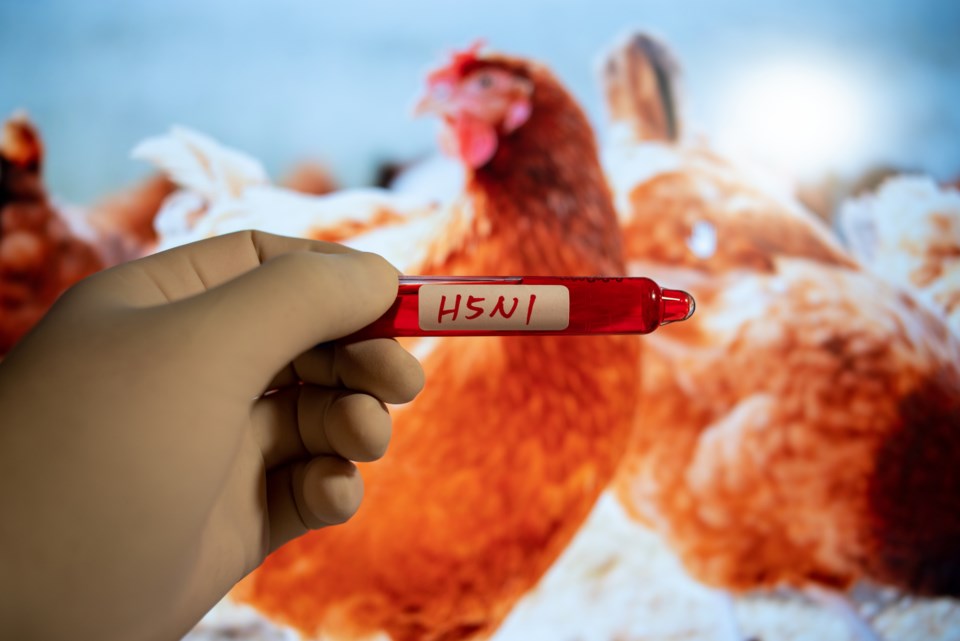Provincial health officer Dr. Bonnie Henry said Tuesday Canadian officials are aware of highly pathogenic avian influenza cases being reported in poultry farm workers in Washington state; however, the matter is not concerning enough to implement screening at the border.
Henry also said B.C. officials have had three recent detections in poultry farms just this week in B.C. and “we’re working very closely with our colleagues in agriculture and the [Canadian Food Inspection Agency] to make sure that those are contained as much as possible.”
On Monday, Washington’s department of health reported four presumptive mild cases of humans contracting the bird flu in Franklin County, located in the southeast part of the state.
On Thursday, the U.S. Centers for Disease Control and Prevention (CDC) confirmed at least two of those cases.
Bird flu, or A(H5N1), is rare in humans but when it strikes a person it is extremely deadly.
The World Health Organization states from 2003 to July 19, 2024 258 cases of human infection with the virus have been reported from five countries within the Western Pacific Region. Of these cases, 141 were fatal, resulting in a case fatality rate of 55 per cent.
The chief concern is human-to-human transmission of a mutated virus, which has not been detected to date.
“There is no evidence of human-to-human transmission at this time,” Washington’s department of health stated Thursday.
“All the identified infections are among workers who had contact with infected birds or their environments. No patients have experienced severe illness or been hospitalized,” added state officials.
“We have regular conversations with my colleagues in Region 10, which includes Washington state,” said Henry.
“So we are very much aware of what's going on in the United States, because they're in Washington state; it is in the southern part of the state. But I'm not concerned about the border so much. What we're concerned about is making sure we're monitoring workers here in British Columbia as well,” added Henry.
The province’s top doctor added that her job is to ensure B.C. poultry farm workers get the updated influenza vaccine “so that there's no chance of being infected with both viruses that can lead to concerning changes in the virus, perhaps.”
Washington officials also highlighted this concern: “Seasonal influenza vaccines do not protect against avian influenza infection, but they make it less likely that a person could get co-infected with both seasonal influenza and avian influenza at the same time. Coinfection increases the risk that a strain of avian influenza virus could arise that spreads easily from person to person.”
Bird flu, said state officials, naturally occurs in aquatic birds around the world, who then infect chickens.
The CDC currently considers the risk to the public from bird flu to be “low” since most instances of people becoming infected with the virus have happened after prolonged, close contact with infected animals.
Henry also said officials in North America are now monitoring outbreaks in cattle.
“We've been watching, and we have a national group that's been monitoring for this in Canada; so far, we have not seen any cases of high pathogenic avian influenza in dairy cattle across Canada,” said Henry.
Bill C-293 to address ‘high-risk species’
As it relates to concerns over novel, deadly viruses emanating from factory farms, provisions in a new piece of legislation have stoked debate in Ottawa.
The Pandemic Prevention and Preparedness Act, proposed by the Liberal government, seeks to require the Minister of Health to establish, in consultation with other ministers, a pandemic prevention and preparedness plan.
A provision of the bill has stirred some controversy. It states: “After consultation with the Minister of Agriculture and Agri-Food, the Minister of Industry and provincial governments, provide for measures to: (iv) phase out commercial activities that disproportionately contribute to pandemic risk, including activities that involve high-risk species.”
Some Conservatives have taken this to mean that factory farming could be eliminated.
“The bill calls for new regulations on farming. It would grant the minister the power to shut down any type of animal farming deemed high risk. Say goodbye to the chicken and pork industries in Canada,” said Renfrew-Nipissing-Pembroke MP Cheryl Gallant.



